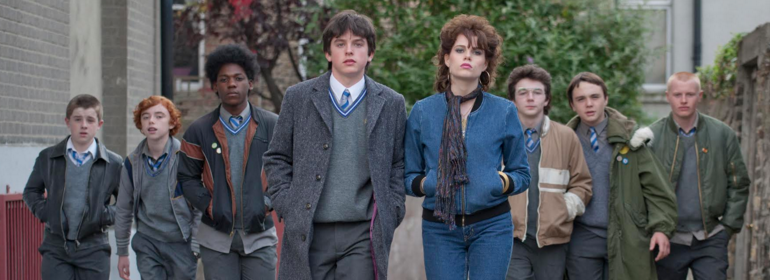A heartfelt ode to youth and music, Sing Street hits all the right notes, says Colum Finnegan
Writer/director John Carney (Once, Begin Again) has put together another musical love poem for a city. Sing Street takes place in Dublin amid the 1980s recession – the youth are flocking to England and the adults are cracking up. Middle class Conor’s world is turned upside down when, in order to save some money, his parents take him out of his private Jesuit school and move him to Christian Brother-run Synge Street, a quintessential school of hard knocks.
Initially he’s out of his depth, but Conor is a confident chap and doesn’t give in to the bullying, be it from the brothers or the students. He soon discovers a beautiful older girl, Raphina (Lucy Boynton), who stands opposite the school every morning. She’s definitely out of his league but an undaunted Conor resolves to talk to her. Raphina tells him she’s a model, so Conor, in order to impress, asks her to star in his upcoming music video. Problem being, Conor isn’t even in a band.
To save face he enlists the help of business-savvy Darren (newcomer Ben Carolan) and the two of them set out to create a Synge Street supergroup. The era is ripe with musical inspiration, from Duran Duran to The Cure, and the boys decide to style themselves as ‘futurists’. They manage to assemble a rag-tag crew of lads and set about becoming a real band.
Conor forms a McCartney-Lennon like relationship with another boy, Eamon, (a spot on debut from Mark McKenna) and together they craft some beautiful songs (mainly written by Carney himself). With all the elements in place, Conor sets out in full pursuit of the mysterious Raphina, with more or less predictable results.
These band forming shenanigans take place over a backdrop of family strife. Conor’s parents (Dad is an oh-so-unlikable Aidan Gillen) are going through a difficult breakup. A verbose Jack Reynor (What Richard Did) plays Conor’s big brother and the wise sage of the piece, spouting timely advice and directing the band from behind the scenes.
While the story is hardly revolutionary stuff, Carney has managed to craft a really wonderful film. He uses the sounds of the era to excellent effect, regularly incorporating the original music videos, often to help explain the esoteric style choices of the fledgling band. He manages to avoid melodrama in his treatment of Synge Street, the boys who go there seem happy enough, if more than a little unruly.
Despite a large and young cast of newcomers Carney has managed to coax out pitch perfect performances. Each of the boys has a moment of comedic gold and all seem perfectly at ease in their roles. Dublin looks fantastic, and the film is a treat to watch.
Carney has dismissed comparisons to The Commitments, the original starting-a-band-in-1980‘s-Dublin film, but the two do share quite a few surface similarities. However, the ages of the characters make them markedly different films. Sing Street dances beyond the relatively formulaic themes of The Commitments and carefully and convincingly deals with the newly forming psyches of the teens. The film is in part a meditation on self-creation and the adoption of a hard exterior image that belies a vulnerable core. Conor uses music both as an escape and as a way to find himself.
Ultimately Sing Street is an uplifting romp through a musically exuberant time and will leave even the most jaded of viewers humming classic ’80s tunes for days after.
‘Sing Street’ is released on March 17
© 2016 GCN (Gay Community News). All rights reserved.
